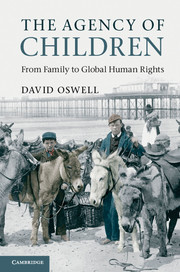1 - Introduction
Published online by Cambridge University Press: 05 April 2013
Summary
The long twentieth century is, and has been, undoubtedly the age of children’s agency. Children are not simply seen to be, but seen, heard and felt to do. Children are not simply beings, they are more significantly doings. They are actors, authors, authorities and agents. They make a difference to the world we live in. Over the period from the late nineteenth century up until now, in the early twenty-first century, children’s capacity to do has intensified and the areas in which they are able to do have proliferated. Children have been seen and felt to do in the life of family, the life of society, the life of politics and the life of economy.
It is not simply that the child in the singular has become a focus of huge emotional, social, cultural, technological and economic investment; rather, it is that over the course of the last hundred years or so children as a class or group or collective of people have become more vocal, more visible and more demonstrable in ways that resonate across our contemporary world. Across this period of time it is not only the presence of children as social actors that is of importance; it is also children’s presence as biological and non-social or pre-social actors that has intrigued investigators, provoked debate, and led, among other things, to research, surveying, institutionalisation, building, support, sanctions and regulations. And children’s presence has been felt by them and by others not simply because somehow children over this period of time have gained a voice which was before hidden, or that they had a strength and political power that has until now not been revealed. No. Rather, children’s capacities to speak, act and become disclosed in particular social, natural and technological contexts has been dependent on their being networked, assembled or infrastructured with other persons and things in such ways as to endow them with powers, which they alone could neither hold nor use.
- Type
- Chapter
- Information
- The Agency of ChildrenFrom Family to Global Human Rights, pp. 3 - 8Publisher: Cambridge University PressPrint publication year: 2012
- 1
- Cited by



